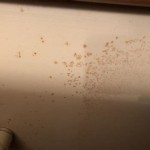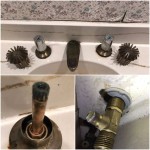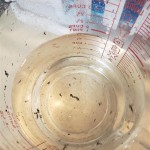Why Does My Bathroom Smell Like Wet Dog?
A bathroom should be a haven of cleanliness and freshness. Yet, many of us have encountered the dreaded "wet dog" smell emanating from this space. This unpleasant odor can be embarrassing and make the whole experience of using the bathroom less than enjoyable. Fortunately, understanding the sources of this smell can help you address the issue effectively.
1. The Canine Connection: Pet Odors
While the smell might evoke images of a wet dog, the source might not be your furry friend at all. Instead, the bathroom's unique environment can sometimes amplify pet odors, even if your dog is not present. Bathroom tiles and grout can trap odor molecules, making the smell linger longer. Additionally, humid environments can create a favorable environment for bacteria to grow, further intensifying the "wet dog" scent.
If your dog is a frequent bathroom visitor, there are a few steps you can take to minimize its contribution to the smell:
- Thorough cleaning: Regular cleaning with appropriate pet-specific cleaning products can help remove embedded odors.
- Air circulation: Ensure adequate ventilation in the bathroom, perhaps by using a fan, to prevent stagnant air and moisture.
- Dedicated dog towels: Invest in towels specifically for your dog to help absorb moisture and prevent the transfer of odor.
2. Sewer Gas: A Silent Culprit
The "wet dog" smell might not actually be a dog smell at all. It could be the result of sewer gas, a common but often overlooked issue. Sewer gas, containing hydrogen sulfide and other volatile compounds, can enter the bathroom through cracks in the plumbing, leaking pipes, or poorly fitted drain traps. This odor can be particularly strong after flushing the toilet or taking a shower, as these actions can create pressure variations in the plumbing system.
To address sewer gas issues, you need to identify the source of the leak and seal it. You can:
- Inspect plumbing: Look for signs of leaks or cracks in the pipes beneath sinks, toilet, and shower.
- Check drain traps: Ensure drain traps are full of water to prevent sewer gas from rising.
- Use professional help: If you suspect a major leak or complex plumbing issue, a plumber can help identify and resolve the problem efficiently.
3. Mold and Mildew: The Silent Growers
Moisture is a breeding ground for mold and mildew, which can both contribute to the "wet dog" smell. Bathrooms are particularly susceptible to these issues due to their high humidity levels. Damp towels, shower curtains, and even grout can harbor mold and mildew spores, which release unpleasant odors.
Mold and mildew eradication requires a multi-pronged approach:
- Ventilation: Improve ventilation to reduce moisture levels and prevent mold growth. This can include using fans, opening windows after showering, and ensuring proper airflow.
- Cleaning: Regularly clean surfaces, including shower curtains, towels, and bathroom floors, with mildew-resistant cleaners.
- Drying: Allow damp areas, such as the shower floor and shower curtain, to dry completely after use.
By understanding the various potential sources of the "wet dog" smell in your bathroom, you can effectively tackle the problem. Identifying the source and implementing appropriate solutions will help restore your bathroom to a clean and fresh haven. Remember, prevention is key. Maintaining proper ventilation, cleaning regularly, and addressing plumbing issues promptly will minimize the risk of this unpleasant odor returning.

My Water Smells Like Wet Dog Quench

Why Does My Dishwasher Smell Like Wet Dog Pur Home Com

Why Does My Ac Smell Like A Wet Dog Trust Heating Air

Why Does My Dog Stink After A Bath Reasons How To Prevent It

Wet Dog Smell What Causes It And How To Fix Bechewy

5 Reasons Why Your Dog Still Smells After A Bath With Tips Toe Beans

Wet Dog Smell How To Get Rid Of It And Why Happens

Why Do Wet Dogs Smell So Bad American Kennel Club

Why Does My Water Smell Like Wet Dog Waterlogic

Why Do Dogs Go Crazy After A Bath Post Zooms Explained
Related Posts







